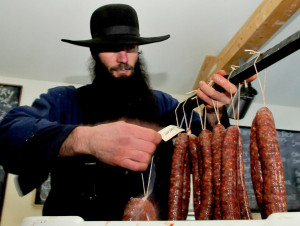Maine’s NPR News Source reports that an Amish deli in Unity that recently attracted national attention for both its meats and its owner’s high profile background as a chef may soon close. Matthew Secich, who runs Charcuterie, told the Bangor Daily News this week that food safety regulations are too overwhelming.

UNITY, ME- January 13: Matt Secich hangs sausages on a bar to dry at his Charcuterie shop in Unity on Wednesday, January 13, 2016. (Photo by David Leaming/Staff Photographer)
The handmade meats that Matthew Secich makes at Charcuterie struck a chord with customers when he opened late last year…and so did his personal story. He told MPBN in January about his background working at renowned restaurants like Charlie Trotter’s in Chicago.
“…. it was a wild tale of chasing the — I guess you could call it the four-star holy grail of the cuisine world and traveled all over the country, working at various great restaurants, working for great chefs, hoping to one day be great.”
Secich abandoned that career for a simpler life, ultimately adopting the Amish faith and settling in Unity with his family. But as business grew when he opened Charcuterie’s doors, so too did the associated paperwork. MPBN was unable to reach Secich for comment for this story. But earlier this week he told the Bangor Daily News that he’s considering closing his deli because of what he says are overly burdensome food safety regulations.
John Bott is a spokesman for the Maine Department of Agriculture, Conservation, and Forestry. He says one point of concern is the ice house Secich uses instead of a refrigerator. Amish shun electricity.
“You have to keep meats at a required 41-degree-Fahrenheit temperature, which is relatively easy to obtain using modern technology, but with an ice house, it could present some challenges.”
Bott says other states with Amish businesses don’t allow ice houses, though the Department is open to Secich keeping his if they can determine it’s safe. Another issue is a federal requirement to create what’s called a Hazard Analysis Critical Control Point plan. It’s an operating plan that lays out strict protocols to minimize food safety hazards. And to comply, it takes mountains of paperwork, says Andre Bonneau of the Sausage Kitchen in Lisbon Falls.

.jpg) eyeing the new shipment hungrily.??Clearly, they couldn’t wait to get a taste.??
eyeing the new shipment hungrily.??Clearly, they couldn’t wait to get a taste.?? issues are cultural. When it comes to dairy farming, becoming a smuggler was the only way to maintain a pure, Amish way of life.“
issues are cultural. When it comes to dairy farming, becoming a smuggler was the only way to maintain a pure, Amish way of life.“